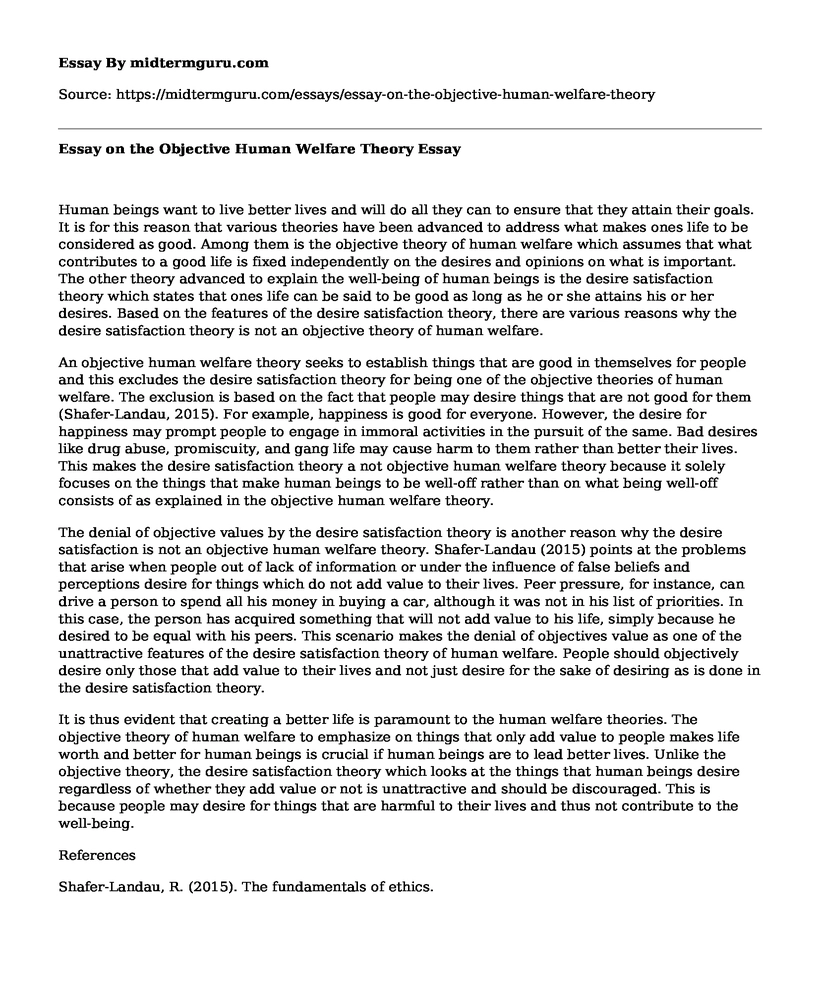Human beings want to live better lives and will do all they can to ensure that they attain their goals. It is for this reason that various theories have been advanced to address what makes ones life to be considered as good. Among them is the objective theory of human welfare which assumes that what contributes to a good life is fixed independently on the desires and opinions on what is important. The other theory advanced to explain the well-being of human beings is the desire satisfaction theory which states that ones life can be said to be good as long as he or she attains his or her desires. Based on the features of the desire satisfaction theory, there are various reasons why the desire satisfaction theory is not an objective theory of human welfare.
An objective human welfare theory seeks to establish things that are good in themselves for people and this excludes the desire satisfaction theory for being one of the objective theories of human welfare. The exclusion is based on the fact that people may desire things that are not good for them (Shafer-Landau, 2015). For example, happiness is good for everyone. However, the desire for happiness may prompt people to engage in immoral activities in the pursuit of the same. Bad desires like drug abuse, promiscuity, and gang life may cause harm to them rather than better their lives. This makes the desire satisfaction theory a not objective human welfare theory because it solely focuses on the things that make human beings to be well-off rather than on what being well-off consists of as explained in the objective human welfare theory.
The denial of objective values by the desire satisfaction theory is another reason why the desire satisfaction is not an objective human welfare theory. Shafer-Landau (2015) points at the problems that arise when people out of lack of information or under the influence of false beliefs and perceptions desire for things which do not add value to their lives. Peer pressure, for instance, can drive a person to spend all his money in buying a car, although it was not in his list of priorities. In this case, the person has acquired something that will not add value to his life, simply because he desired to be equal with his peers. This scenario makes the denial of objectives value as one of the unattractive features of the desire satisfaction theory of human welfare. People should objectively desire only those that add value to their lives and not just desire for the sake of desiring as is done in the desire satisfaction theory.
It is thus evident that creating a better life is paramount to the human welfare theories. The objective theory of human welfare to emphasize on things that only add value to people makes life worth and better for human beings is crucial if human beings are to lead better lives. Unlike the objective theory, the desire satisfaction theory which looks at the things that human beings desire regardless of whether they add value or not is unattractive and should be discouraged. This is because people may desire for things that are harmful to their lives and thus not contribute to the well-being.
References
Shafer-Landau, R. (2015). The fundamentals of ethics.
Cite this page
Essay on the Objective Human Welfare Theory. (2021, Jun 01). Retrieved from https://midtermguru.com/essays/essay-on-the-objective-human-welfare-theory
If you are the original author of this essay and no longer wish to have it published on the midtermguru.com website, please click below to request its removal:
- Essay on Marxs Theory of Alienation and Philosophical Categories
- Essay Sample on Ethical Reasoning: Kant Versus Stuart Mill
- Identity Development in the Multicultural World - Research Paper
- Ethics in Business: Utilitarian & Principles-Rights Frameworks - Essay Sample
- My Opinion About Chris McCandless and Transcendentalism
- Reflect and Define: A Professional Counselor's Path to Success - Research Paper
- Reviewing Forms for Compliance: Frequency & Preparedness - Essay Sample







